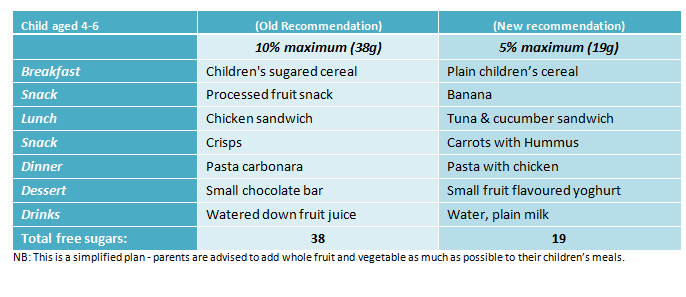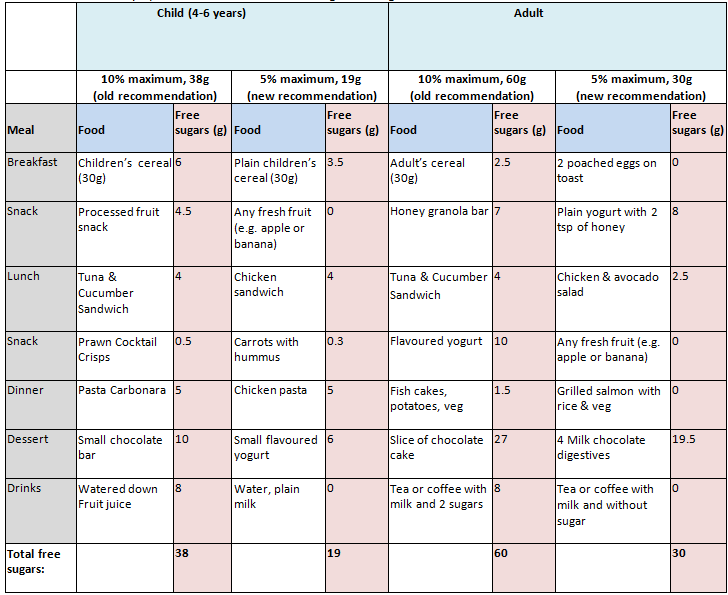Sugar - Cameron Must Act Now
• Government's advisory committee FINALLY agrees to halve the recommendation for free sugars [1] intakes to less than 5% of daily energy intake (i.e. 30g (7 tsp) for an adult) [2] – less than one can of Coca Cola [3].
• Calls for sugar-sweetened beverages to be minimised
• This represents a large and absolutely necessary reduction in sugar from current intakes; 12.1% to 5% for adults and 15.6% to 5% of daily energy intake for teenagers [4]
• David Cameron must immediately take charge if the NHS is going to be saved from the crisis that we face from obesity and type 2 diabetes
For media coverage, click here: SACN draft report - media coverage
After seven years of deliberation, the Government's Scientific Advisory Committee on Nutrition (SACN) has issued their FINAL report on carbohydrates, including sugars in people's diets. The report recommends that less than 5% of people’s daily energy, down from the previous recommendation of 10%, can come from free sugars (approx. 30g (7 tsp) for an adult per day) – one can of Coca Cola contains 35g, or 9 tsp of sugar.
Over a year ago following a request by Jeremy Hunt, the Secretary State for Health; Action on Sugar gave him a simple evidence-based seven-step programme to tackle the crisis in childhood obesity [5]. This included a sugar reduction programme similar to the already successful salt reduction programme [6] to achieve 40% reduction over 4 years in free sugars in all processed foods and soft drinks by reformulation. But as yet Jeremy Hunt and the Department of Health have done nothing. Given that tooth decay, obesity and type 2 diabetes are now a major threat to the NHS, it is clear that the Prime Minister must now tackle this crisis himself.
Action on Sugar calls upon the Prime Minister to immediately implement at least 3 evidence-based actions:
1. Sugar reduction targets for food and drinks – 40% reduction by 2020 [7]
2. Cease all advertising and promotion of unhealthy foods and drinks to children and adolescents
3. A 20% duty on sugary drinks (a similar tax in Mexico has already reduced consumption by 12%) [8]
This plan needs to be run by a strong independent nutrition agency with statutory powers, for example Public Health England, if they were given more power and independence. The ‘Responsibility Deal’, where the Department of Health made the food industry police themselves, has not worked and must be abolished.
Professor Graham MacGregor, Chairman of Action on Sugar says: “These actions will prevent obesity and type 2 diabetes and will ensure the UK food industry leads the world as it has been doing for salt reduction. The food and drink industry does not want to cause any more harm to its customers; they are waiting to be told what to do and it is essential that they are given a level-playing field so that they are all working towards the same goal. This policy must therefore be enforced by a strong independent agency.”
Professor Simon Capewell, Professor of Clinical Epidemiology at the University of Liverpool and Action on Sugar Advisor commented: "British children and parents are currently drowning in a world full of sugary drinks, cheap junk food and aggressive marketing. But in some other countries, regulations and duties have successfully reduced sugar intake. Can the UK government now show that they are also genuinely committed to promoting our children's health, rather than supporting industry profits?"
Professor Aubrey Sheiham, Emeritus Professor of Dental Public Health at University College London and Action on Sugar Advisor adds: “Sugar is toxic to teeth. Regulating sugar consumption will reduce the most common sugar-induced disease in the world, namely, tooth decay. The worldwide epidemic of tooth decay will only be controlled when manufacturers markedly reduce levels of sugars in their products.”
Kawther Hashem, Nutritionist at Action on Sugar commented: “SACN recommends we drink less sugary drinks. Many popular sugary drinks cannot be included within a healthy diet plan - as they can contain anywhere between 30g and 50g of sugars per can or bottle – your entire 5% recommendation (30g). Soft drinks companies must reformulate their sugary drinks immediately if they want to be consumed as an occasional ‘treat’ within a healthy diet.”
Katharine Jenner, Campaign Director of Action on Sugar adds: “These recommendations are all well and good in theory, but our current sugar intakes are so high because the food industry adds large amounts of completely unnecessary sugar to our everyday foods, which all adds up.
“By reading the labels and switching to the lowest sugar options available, the new recommendations are difficult but can be achieved for both adults and children; here is an example meal plan for a child [9]”:

Ends
Notes to Editor
For more information contact:
- National PR - David Clarke: david@rock-pr.com 07773 225516
Website http://www.actiononsugar.org/
Tweet https://twitter.com/actiononsugar #LessSugar
Action on Sugar is a group of specialists concerned with sugar and its effects on health. It is working to reach a consensus with the food industry and Government over the harmful effects of a high sugar diet, and bring about a reduction in the amount of sugar in processed foods. Action on Sugar is supported by 23 expert advisors.
[1] Free sugars – includes sugars that are added to food, as well as sugars that are naturally present in honey, syrups, fruit juices and fruit juice concentrates, not sugars in milk products and whole fruit & vegetables.
[2] The final Carbohydrates and Health report by SACN recommends minimising consumption of sugar-sweetened beverages and halving free sugars in the diet to no more than 5% of daily energy intake. This is:
- 19g or 5 sugar cubes for children aged 4 to 6,
- 24g or 6 sugar cubes for children aged 7 to 10,
- 30g or 7 sugar cubes for 11 years and over, based on average population diets.
Click here to view the SACN Press Release.
[3] Can of Coca Cola contain 35g of sugars, there are 4g sugars in a teaspoon. http://www.coca-cola.co.uk/drinks/coca-cola/coca-cola/
[4] PHE. 2014. National Diet and Nutrition Survey: results from Years 1 to 4 (combined) of the rolling programme for 2008 and 2009 to 2011 and 2012 https://www.gov.uk/government/publications/national-diet-and-nutrition-survey-results-from-years-1-to-4-combined-of-the-rolling-programme-for-2008-and-2009-to-2011-and-2012.
[5] Action on Sugar. Time for Action. Childhood Obesity Plan as Requested by Jeremy Hunt MP. 22nd June 2014.
http://www.actiononsalt.org.uk/actiononsugar/Press%20Release%20/133978.html#sthash.zt4vR9z4.dpuf
[6] He, F. J., Pombo-Rodrigues, S. & Macgregor, G. A. 2014. Salt reduction in England from 2003 to 2011: its relationship to blood pressure, stroke and ischaemic heart disease mortality. BMJ Open, 4, e004549.
[7] Action On Sugar has calculated that a 40% reduction in sugar added by the food industry which, given a reasonable timeframe (by 2020) is easily achievable, would result in a reduction in calorie intake of approximately 100kcal/day and more in those people who are particularly prone to obesity. This reduction in calorie intake is predicted to reverse or halt the obesity epidemic and will also have a significant impact in reducing type 2 diabetes (Department of Health, 2011. Healthy lives, healthy people. https://www.gov.uk/government/uploads/system/uploads/attachment_data/file/213720/dh_130487.pdf)
[8] Mexico’s National Institute of Public Health study indicates the federal sugar-sweetened beverage tax is successfully reducing purchases in Mexican households. 2015. http://www.actiononsalt.org.uk/actiononsugar/Sugar%20in%20the%20news/2015/157960.pdf
[9] Examples of daily diets for a child and an adult - showing the difference between a 10% and a 5% daily energy intake from free sugars.
- The data was collected online via the supermarket’s website.
- Where many options are available, the average free sugars content was estimated.



